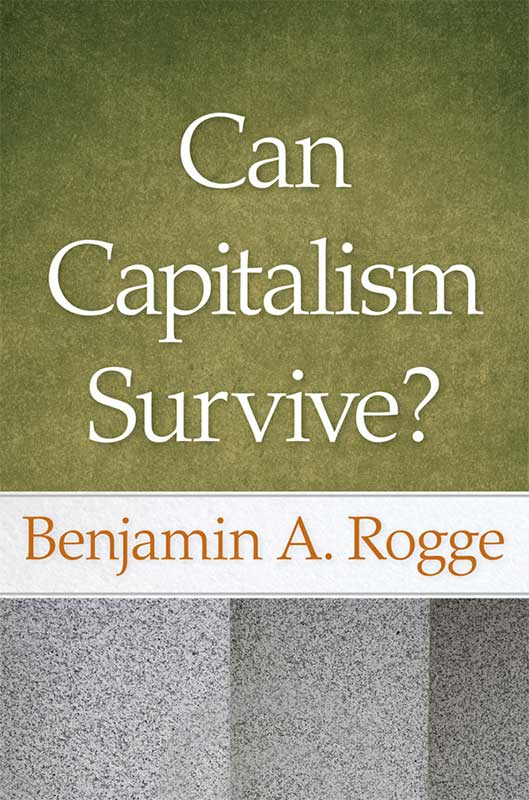Can Capitalism Survive?
By Benjamin A. Rogge
One of the signs of advancing age in the American college professor is a tendency for him to write less and publish more. This seeming paradox is easily explained by the phenomenon of
Collected Works, that is, by what on television would be described as reruns. As in television, no great public outcry is needed to bring forth the reruns; a question from his wife, a polite suggestion from a colleague, and the cut-and-paste operation is under way.I have put together here what I believe to be the best of the rather meager output of my professional career up to this point. For reasons (mostly financial) that always seemed adequate at the moment, I have been more of a speechmaker than a writer. Thus, you will find that many of the pieces in this collection are but speeches put down on paper…. [From the Foreword]
First Pub. Date
1979
Publisher
Indianapolis, IN: Liberty Fund, Inc. Liberty Fund, Inc.
Pub. Date
1979
Comments
Collected essays.
Copyright
The text of this edition is under copyright. Picture of Benjamin Rogge: file photo, courtesy of Liberty Fund, Inc.
- Foreword
- Part I, Introduction
- Part I, Chapter 1, Can Capitalism Survive
- Part II, Introduction
- Part II, Chapter 1, The Case for Economic Freedom
- Part II, Chapter 2, The Libertarian Philosophy
- Part II, Chapter 3, Who is to Blame
- Part II, Chapter 4, Paradise in Posey County
- Part III, Introduction
- Part III, Chapter 1, Adam Smith, 1776-1976
- Part III, Chapter 2, Christian Economics: Myth or Reality
- Part III, Chapter 3, College Economics: Is It Subversive of Capitalism
- Part IV, Introduction
- Part IV, Chapter 1, Profits
- Part IV, Chapter 2, The Businessman
- Part V, Introduction
- Part V, Chapter 1, The Labor Monopoly
- Part VI, Introduction
- Part VI, Chapter 1, The Long-Run Economic Outlook
- Part VI, Chapter 2, Alleged Causes of Inflation, Corporate Monopolies
- Part VII, Introduction
- Part VII, Chapter 1, The Problems of Cities
- Part VIII, Introduction
- Part VIII, Chapter 1, Financing Higher Education in the United States
- Part VIII, Chapter 2, The Promise of the College
- Part IX, Introduction
- Part IX, Chapter 1, The Businessman and the Defense of Capitalism
- Part IX, Chapter 2, Reflections on the Election of 1964
- Part IX, Chapter 3, The Foundation for Economic Education, Success or Failure
Part VII, Introduction
Part VII
ON THE PROBLEMS OF CITIES
The following paper was prepared in response to an invitation in 1972 from the Center for Constructive Alternatives at Hillsdale College to be one of the speakers in a seminar on the general topic, “Recycling the Cities: Alternatives to Decay.” I brought to the task little more than a set of ready-made prejudices; not unnaturally, my further studies did little to alter those existing opinions. I am pleased that it did give me an opportunity to pay tribute to a woman whose work I had long admired, Jane Jacobs. I still find in her work a more perceptive handling of the idea of a city than in any other material in this topic area.
Sick Cities: Psychology and Pathology (Baltimore: Penguin Books, 1963), p. 20.
The Death and Life of Great American Cities (New York: Vintage Books, 1961), pp. 220-21.
An Essay on the History of Civil Society, 1st ed. (1767), p. 187.
Individualism and Economic Order (Chicago: University of Chicago Press, 1948) pp. 6-8.
The Coming Aristocracy (Irvington, N.Y.: Foundation for Economic Education, 1969), pp. 142-49.
Journal of Law and Economics, V (October 1962): 103-9.
An American Dilemma (New York: Harper, 1944), p. 297.
Economics, 7th ed. (New York: McGraw-Hill, 1967), p. 377.
The Public Interest, 25 (Fall 1971): 17.
The Federal Bulldozer (Cambridge: MIT Press, 1964).
Great American Cities, pp. 4-5.
Economics and Urban Problems, (New York: Basic Books, 1970), pp. 143-4.
Economics and Urban Problems, pp. 9-10.
Great American Cities, pp. 9-10.
Part VIII

